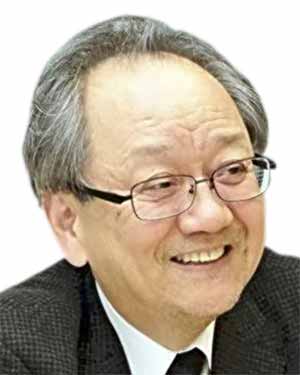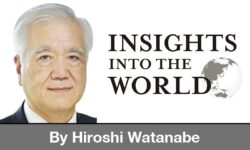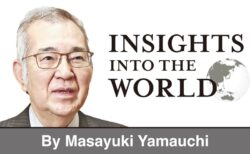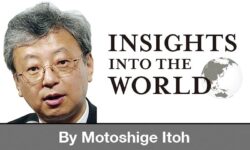21:13 JST, June 2, 2023
The COVID-19 pandemic and Russia’s invasion of Ukraine have brought to the fore a myriad of difficulties facing the world’s countries in terms of both internal politics and diplomatic matters. Japan, for instance, is confronted with such issues as how to have the central and local governments share the roles and responsibilities of domestic administration in a mutually beneficial way, as well as how to develop and implement Japan’s foreign policy amid the rising tensions between the United States and China.
Although local autonomy and diplomacy do not appear connected to each other, they are actually related to a surprising degree. In his book titled “Bunkenron” (On Decentralization of Power, Advocating Less Centralized Government in Japan), Meiji-era educator Yukichi Fukuzawa (1835-1901) defined local government as an essential setting for the “training” to carry out diplomacy. In other words, to become competent in conducting independent diplomacy, the people must first acquire the spirit of governance on their own, in their respective regions.
India and Indonesia have been bolstering their national power against a backdrop of economic growth, and in recent years they have drawn attention from the international community over foreign policies that are underpinned by national interests and reasons unique to New Delhi and Jakarta. India’s border tensions with China have been rekindled, and it has joined Japan, the United States and Australia, countries with which it shares the value of liberal democracy, to establish the Quad security framework. It has also participated in the Washington-launched Indo-Pacific Economic Framework for Prosperity (IPEF), aiming to intensify cooperation with other countries.
Nevertheless, since 2022, India has repeatedly abstained from U.N. Security Council and General Assembly votes on resolutions that denounced Russia’s invasion of Ukraine. India has thus adhered to its tradition of pursuing its own national interests amid the fierce tensions between the great powers.
In its diplomatic activities, Indonesia does not necessarily follow the generally accepted code of relationships between private individuals. In 2022, Indonesian President Joko Widodo attended the Group of Seven summit in Elmau, Germany, as the leader of an invited partner country, and emphasized Jakarta’s need for large amounts of investment during a session with the G7 leaders. He then flew to Moscow to meet Russian President Vladimir Putin and discuss food and fertilizer supplies from Russia, among other issues. To continue his diplomatic blitz, Widodo visited Beijing for a meeting with Chinese President Xi Jinping, where he talked about consolidating the Indonesia-China partnership through the Belt and Road Initiative, a China-initiated global infrastructure development strategy.
Both countries conspicuously stick to a self-focused, utilitarian stance on the diplomatic front. In 1936, Nazi Germany signed the Agreement against the Communist International, or the Anti-Comintern Pact, with Japan, but then signed a bilateral treaty of nonaggression in August 1939 with the Soviet Union. This compelled then Japanese Prime Minister Kiichiro Hiranuma’s Cabinet to resign en masse with his lament that “the world of Europe is complicated and inscrutable.” Criticizing this as proof of the naivety of Japanese diplomacy, Tanzan Ishibashi, the managing editor of the weekly Toyo Keizai Shimpo, who became prime minister in the 1950s, wrote that diplomacy was a business that had to be conducted in terms of profit and loss, as long as there was no lying or incivility.
On the level of private individuals, it is important for people to be as sincere as possible with friends, partners and so on, and to cherish relationships. However, the nature of relationships between countries is fundamentally different from those between individuals. Therefore, in the international community where sheep-like and wolf-like countries repeatedly play the game of making and breaking alliances, not only politicians and diplomats but also people in general should be “wise like a snake” instead of “naive like a dove.”
Diplomacy should not be dictated by so-called popular opinion and narrow-minded nationalism. In his recent book “Kindai Nihon Gaiko-shi” (A history of modern Japanese diplomacy), Yuichi Sasaki, an associate professor at Meiji Gakuin University, pointedly argues that diplomacy is an extremely difficult “art.” According to his analysis, sufficient knowledge of relevant foreign countries’ internal affairs, and of the globally accepted principles that govern international relationships, is a prerequisite in the execution of foreign policy. The outcome of that foreign policy depends on the stance of each side, Sasaki says, resulting in discrepancies between what is sought and the actual outcome.
Fukuzawa became critical of the increased centralization of government in Japan following the Meiji Restoration, and argued that the Japanese had become so indifferent to things around them that they were no longer enthusiastic about engaging in debates regarding local interests. It was therefore obvious, he said, that the Japanese could not help being nonchalant on the diplomatic front as well.
In Fukazawa’s 1875 book titled “Bunmeiron no Gairyaku” (An Outline of a Theory of Civilization), the Meiji-era thinker exhorted the Japanese population to have the grit to “compete for profit, that is to say, compete for reason.” He added, “Now is the time for Japan to fight for reason by competing with foreigners for profits.”
Halt regions’ decline
Looking at postwar Japan, the question arises about who the main culprits are in the decline in the governance of local communities in the decades following the end of World War II. The certainly relevant answer is the discrepancies between the principle of local governance stipulated in the Constitution and the actual situation involving local governments and the anomalous state of their finances.
In recent years, Japan’s local governments, except for Tokyo and other metropolitan areas, have been saddled with overwhelming deficits. One reason for this is that local government finances are far from economically sustainable on their own. The reality is that while local governments need to make enormous fiscal expenditures, tax revenues are more likely to go directly to the central government’s coffers, forcing local governments to rely on tax allocations from the central government to make up for their fiscal shortfalls.
To put it simply, there is no guarantee of the fiscal independence of local governments. No economic independence means no chance of becoming self-sustainable and self-respecting. Without money, they cannot afford to do anything, even when they want to use ingenuity to solve local problems.
Involvement in local autonomy enables us to learn what liberal democracy is. Japan’s local governance is a system guaranteed unequivocally by Chapter VIII of the Constitution. However, the central government is superior to local ones regarding authority for public functions and control over fiscal resources, a situation that prevents the spirit of local self-government from prevailing, as the House of Councillors Commission on the Constitution has pointed out
The core of freedom is whether we are able to do what we believe we should do. Moreover, matters related to each area should be conducted at the will of and under the responsibility of local residents, who are most familiar with them. This principle should be respected. For their part, local residents need to be committed to preparing themselves to be involved in local governance. Otherwise, the principle of local governance will come to naught. There is a danger that the central government will discourage local residents from acting on their own initiative to the extent that they will become obedient — verbally criticizing the government yet distancing themselves from what they should do — and less independent-minded.
Let me cite a positive example. The Smart Disaster Prevention Eco-town was opened as a collective relocation project for survivors of the Great East Japan Earthquake of 2011 in Higashimatsushima, Miyagi Prefecture, with local residents taking the initiative in its construction. Their statement that they had promoted the reconstruction project to ensure “our self-reliance” was impressive.
A negative example is the about 40% reduction in the number of public health centers run nationwide by local governments over the about 20 years until 2016 — without major opposition from the public. With the health center workforce also trimmed, the pandemic has consequently caused the network of health centers to handle a much heavier workload.
At the end of the day, it is doubtful that people who are indifferent to local communities’ needs and interests will carry out robust diplomacy. Nonetheless, if people still have the perseverance to nurture the grit and courage to take up local interests, local government will surely become a powerful setting for the “training” to “conduct diplomacy,” as advocated by Fukuzawa.
To enable Japan’s local governments to acquire more vitality, the country should reexamine the principle of local self-government as stipulated by the Constitution, to ensure the fiscal independence of local authorities and loosen the central government’s reins over local government finances.
Recently, the overconcentration of people and business is gathering pace once again. If declining regional areas are revitalized, Japan will definitely be able to find ways to solve its social challenges, namely population outflows from regional areas, decreasing job opportunities and regional inequality as in medical and welfare care, among other problems.
The tendency to harbor a vague longing for the hub of the country, based on a perception that living conditions are “high in the center” and “low in regional areas” undermines the potential to foster local government, likely impeding the chance of training for independent diplomacy. Now is the time to reexamine how local autonomy is being conducted.

Takenori Inoki
Inoki is a professor emeritus at Osaka University, where he also served as dean of the economics department. He was a special professor at Aoyama Gakuin University from 2012 to 2016. Prior to that, he served as director general of the International Research Center for Japanese Studies from 2008 to 2012.
The original Japanese article appeared in the May 28 issue of The Yomiuri Shimbun.
Top Articles in Editorial & Columns
-

Riku-Ryu Pair Wins Gold Medal: Their Strong Bond Leads to Major Comeback Victory
-

40 Million Foreign Visitors to Japan: Urgent Measures Should Be Implemented to Tackle Overtourism
-

China Provoked Takaichi into Risky Move of Dissolving House of Representatives, But It’s a Gamble She Just Might Win
-

University of Tokyo Professor Arrested: Serious Lack of Ethical Sense, Failure of Institutional Governance
-

Policy Measures on Foreign Nationals: How Should Stricter Regulations and Coexistence Be Balanced?
JN ACCESS RANKING
-

Japan PM Takaichi’s Cabinet Resigns en Masse
-

Japan Institute to Use Domestic Commercial Optical Lattice Clock to Set Japan Standard Time
-

Israeli Ambassador to Japan Speaks about Japan’s Role in the Reconstruction of Gaza
-

Man Infected with Measles Reportedly Dined at Restaurant in Tokyo Station
-

Videos Plagiarized, Reposted with False Subtitles Claiming ‘Ryukyu Belongs to China’; Anti-China False Information Also Posted in Japan























